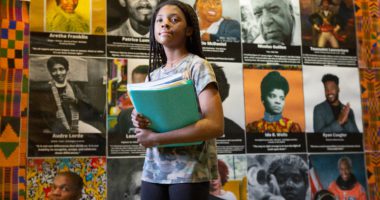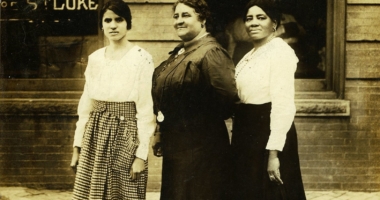4 Ways Education Leaders Can Respond to Anti-Black Rhetoric
From about 1925-1961, Nannie Helen Burroughs, an educator and activist who started her own school in Washington, DC, required her students to take both an oral and written Black history exam to graduate from her school. This act of liberation ensured that Black children knew their people’s and country’s history. If Burroughs were alive today, she’d be the subject of an attack by anti-Black leaders who’ve maintained that this country’s factually accurate history has no value and should be kept out of the hands of students.
It’s no secret that bigoted leaders have launched an all-out war on public education. From Florida to Virginia, state leaders have deliberately been rejecting the teaching of honest history of this country and targeting communities of color and other marginalized groups. The extreme right’s latest attempt to rid classrooms of factually accurate history is an outright attack on Black people. Erasing an integral part of U.S. history will also impact White children, as they will be taught to live a lie about their ancestors’ role in shaping America’s political and societal landscape.
Whereas this divisive rhetoric has previously been relegated to backrooms, kitchen tables, and golf courses for decades, it has now been given a political pulpit. But even before this public debacle, few classrooms in this country taught the factually accurate history of this country. Below are four ways anti-racist education leaders can respond:
1. Acknowledge the factually accurate history of racism and oppression with staff and students
The cornerstone of quality education is growth. Few people want to acknowledge the racist history of this country. For some, doing so forces them to acknowledge an ugly part of America’s past. But those who fail to acknowledge history are doomed to repeat it. What better place than the classroom to name the truth about our nation then and now?
Far too often, teachers and leaders are expected to shy away from the hard conversations of how America became the country it is today. Instead, teachers and leaders must hold space to share the factually accurate history of our country for the hard conversations to take place and to allow students to be inquisitive about our history. Learning for Justice, formerly Teaching Tolerance, provides many resources for education leaders on the journey.
2. Support teachers to reject racist rhetoric by empowering them to center justice and equity in their teaching and curricula resources
As education leaders build academic support plans to finish the year strong and detail summer professional learning plans, an explicit focus should be on teaching for justice and equity. Many teachers want to center equity and justice in their teaching but need more training.
Leaders should develop teacher re-training programs to support teachers in leading crucial conversations on how to support students in analyzing historical documents. In addition, teachers should be required to do hard identity work to understand who they are and how their experiences and identity shape their identity and view of teaching and learning. Kaya Henderson and Reconstruction has an incredible hub of already prepared resources school leaders might use to re-train teachers.
3. Empower and support parents with the tools they need to advocate for their children’s education
When parents have the tools and knowledge to advocate for their children, they can be a powerful force toward change. Educators need to see parents as allies in educating their children. But, as we’re seeing action on the conservative side, parents can also be a powerful weapon. For example, organizations like Moms for Liberty have proposed lists of books that should be banned that provide for the teaching of factually accurate history.
School leaders must actively work to engage parents in a positive dialogue around the systems at work, both in support and against their children. What’s more, education leaders should see parents as policy movers, shakers, and influencers. Engaging parents in this way will require focused attention through parent meetings and workshops. William Jackson, Ph.D. and Village of Wisdom have laid a framework for supporting parents as policymakers.
4. Elevate student voices at the district, school, and classroom levels by providing space to identify and select curriculum resources
In Arkansas, some 50 years ago, Daisy Bates laid a framework for what can happen when students organize themselves. Bates took the lead role in organizing young people, commonly referred to as the Little Rock Nine to integrate Central High School.
Today, that framework should be re-deployed to mobilize students to fight for their education. However, few systems are afraid of what will happen if students organize themselves and advocate for their own education and safety, as they did with March for Our Lives. However, given that the attack is on their education, students need to be mobilized to push back against the attack on their education.
Students should have a say in their learning; however, little opportunity exists for students to engage in this way. While there have been recent moments to center student voice by including students on local school boards, this is generally one student. This movement requires a mass of students speaking out for their right to a factually accurate American history. Mohan Sivaloganathan and Our Turn have done an incredible job mobilizing students to become advocates for their education, providing an example of how education leaders might begin organizing students.
To make all this work, state and district leaders will have to collaborate with teachers, students, parents, and communities to fight against racist, discriminatory, and exclusive policies, because these policies and practices ultimately harm students — especially Black students.
Dr. Phelton Cortez Moss is a Senior Professorial Lecturer of Education Policy & Leadership at American University. He has also served as Senior Education Policy Advisor in the US House of Representatives for a ranking member of the House Education and Workforce Committee. Previously, Phelton was Greenwood District in Mississippi’s Teacher of the Year for two consecutive years and served as a middle school principal before becoming the State Director of Education Effectiveness and Talent at the Mississippi Department of Education.












